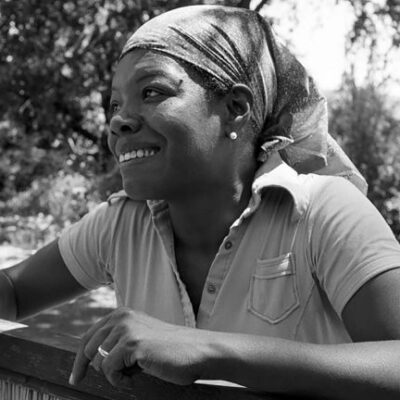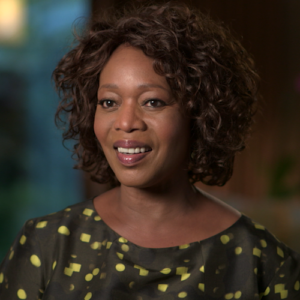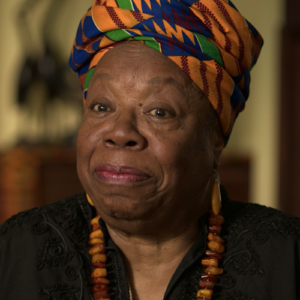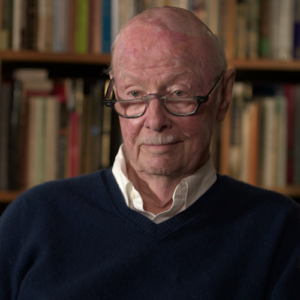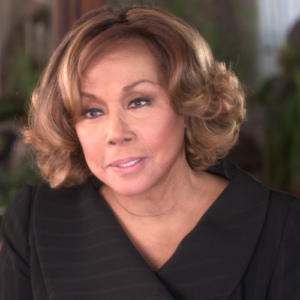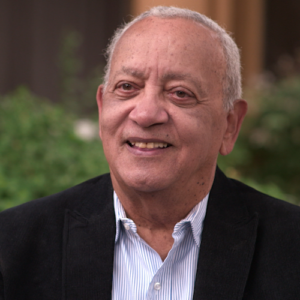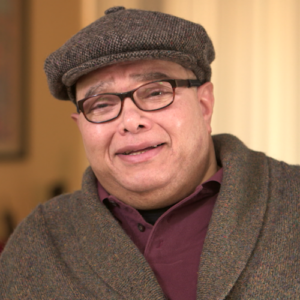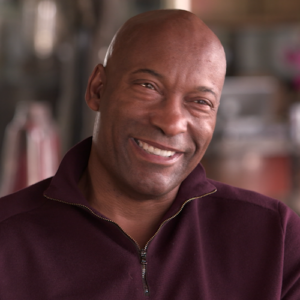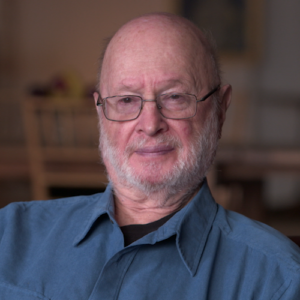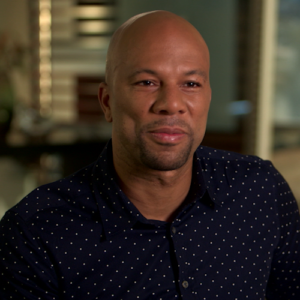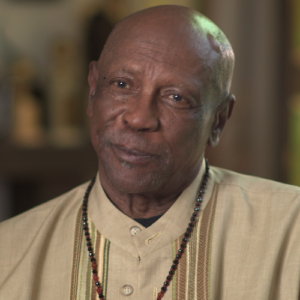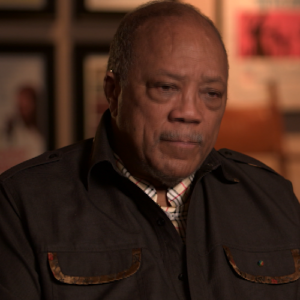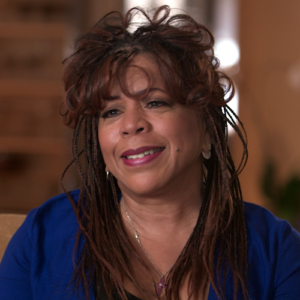Interviewer: So I want to go right into the times that were happening when you came in back to Harlem from Los Angeles in 1969. And by that, I mean describe how how race and African American artists, what was going on at that time? What was it like?
Louise Meriwether: And you ask a question that I don’t even know. What was it like? I don’t know. I was up in the Bronx. I was living up in the Bronx. And when I came back, I can just tell you there was a lot of activity going on in Harlem because they were trying to build the Harlem State Office building on 125th Street and Seventh Avenue. And the community didn’t want the building there, and they thought it was too big brother, you know, eavesdropping on them. So they decided that they would camp out and they had their camps and they would on the grounds, you know, they were staying there overnight. And all the city did was wait until winter came. And when the snow came, they left and they and they put the building up. So that’s what was happening in Harlem. What was happening with artists, I really don’t know. I came back in 1969. My first book was being published in 1970, so I came back for that and I met Rosa Guy and Maya Angelou. When my book was published, they invited me to come to a meeting of the Harlem Writers Guild, and that’s when I came and that’s when I met them. And we’ve been friends ever since. So that’s when I became involved in the writers community in Harlem. Poor Marshall was there in that group, John Oliver Killens and Max Roach. She was just a. Everybody, everybody. Playwrights and writers have all gone through the Hollywood Writers Guild, which Rosa Guy founded with with the talent, Henry Clark and Bob Christmas, I think. Yeah. So that was what was going on. And all we were doing was writing. People asked what was going on. We were just writing, trying to get our work written and published, and that’s what was going on.
Interviewer: We were in that writer’s group. So you had. You had written your book? Mm hmm. You were invited in. Do you remember any of the just say things that would happen between you, Maya, the group in terms of how was it was a very was it a tough group? Were they critical at reading to help the writers? How? How did it work?
Louise Meriwether: Well, everybody is writing. And then you come to the group and what you want is the criticism. And the criticism is always constructive, meaning that it’s not destructive. You don’t want to go out and see the thing up until yourself, until the river, you know. So the criticism is constructive, and that is the purpose of a writer’s group, which I always found to be very helpful. And that way, you you bring in your material there so that you can read it to the group and then they can tell you what they think about it. And then you can go home and you can either agree with it or disagree with it. And that’s the purpose of a writer’s group. So this group was no different than any other group. I don’t know what else to say about it. Maya had already written I Know Why the Caged Bird Sings, and she was thinking of writing another piece about it, and she would, I think, read it and might have disagreed with it. I don’t know. I don’t know what she worked on after that in the group, I don’t remember. But everybody in there was working on something. And participating in criticizing the other writers were. That’s all the writing group is for.
Interviewer: What did you think when you first read? I Know Why the Caged Bird Sings. What did you think of the work?
Louise Meriwether: I thought it was very good and it was similar something to mine, you know. But her book came out first. Her book came out a couple of months earlier than mine did. And I read it and I thought it was very good. You know, I don’t remember anything else except that I read it. And it was interesting. It was very good. It was very well written. And that’s all I thought about it. What the other things that we did in the writers group is we also helped other young writers. For example, we had a first book party for what’s her name. I get people’s names now, but we would give book parties, you know, for people, you know, whether it’s a first book or whatever. What’s the girl’s name? Purple Color. Purple. Alice Walker. Alice Walker’s first book we gave her we gave her the book party for her first book at John Henry Clarke’s house. And when we gave a book party, we would we all would make the food. Somebody would do the boiled eggs and somebody else would do the chicken and somebody else would, you know. And so we would have the refreshments that we all cooked, you know, and the with my would be cooking. But my it’s a very good cook and everybody knows. But we also did that other than criticizing each other’s work. We supported other writers, especially younger writers, as they were coming up. We always gave them book parties.
Interviewer: That was quite a crowd. So give me something about the personality of Maya Angelou at that time in the sixties and what was her personality like. I know that she often has attitude. She has passion. She. Tell me a little bit about her.
Louise Meriwether: She was. She’s always been so gracious and very generous. And she loves to cook. She used to live right across the way from here. And we would go perhaps to hear somebody sing or something, and then she would invite everybody back to her house. And I would simply say, Louise, go in the bedroom. And she had a twin beds. And we would go in the bedroom and turn the twin beds around and make it into like a studio. And she’d be in the kitchen that only some ham hocks is something cooking something, you know. And we would be having a lovely party and it would be wonderful. She was always very generous and gracious like that, and she always loved to invite people to her home, you know? And any time we would go out to a concert or anything, you can be sure that we were going to end up going back to my house and eating and sitting on the floor and drinking and cracking up and telling jokes and having a grand time. She’s very good and very wonderful with people because. She first loves people. I know my mother, Rosa Guy and my mother were very close. And when I went to Texas Assembly where I went to teach, Rose Guy would come by my house every day and bring my mother fresh bread. And my mother adored her and she adored my mother. I said to my mother once, I said, Why do you love Rosa so much? She says, I love Rosa because Rosa first loved me and I always think about Maya. And that way. Maya truly respects people and loves them no matter what their stripe. And that’s why they are so. Loving towards her because she first loves them. I never I she’s I’ve all the people that I know I think they she is the most caring in that respect is why she has so many friends and so many admirers. She really and truly first loves people, first loves people, and then they respond to her. She also inspires them with their own life story. You know, she’s been with somebody said she’d been way, way down there, you know, And so since she was able to rise up and become who she is, I can do likewise. And that’s one of the reasons why she always tells a story about, you know, her child to it, to let people know that they, too, can overcome their mean circumstances. So she’s always been very good. I’ve always found her to be very gracious and very good in that respect. I don’t think that we have ever had any serious argument. I don’t believe we ever had.
Interviewer: Now, James Baldwin was part of that group at that time, too.
Louise Meriwether: Or was he? No, he wasn’t. James Baldwin was never in the Harlem Writers Guild. James Baldwin was a friend of Meyers and James Baldwin was a friend of mine. But he was not in the Harlem Writers Guild. He was at, you know, in France or Turkey or wherever. And, uh, right on the corner of 96th Street and and Columbus Avenue was what’s the name of the grill that was there. And James Baldwin’s brother worked there as a bartender, and that was our hangout. Any time he would be in town, he would be at that bar, McHale’s McHale’s in the corner of 96th Street and Broadway. And and and as I said, my I live right across the way from here. So McHale’s was our hangout, you know, our bar. We loved bars. I must say that We loved bars. All of us loved bars. We rose the Miami bar. Still people. Yeah. I don’t know if I’m answering your question. I have a tendency to roam around a little bit. That’s okay.
Interviewer: So. Were you? You also all were not just writers. You were some. You were social activists.
Louise Meriwether: Very much so.
Interviewer: So did you and Maya do some things together in terms of activism?
Louise Meriwether: It’s very strange that we did not. I did things with Roseanne and with Rosa Guy, but not with Maya, because my you see left here. Maya was when I came back in 69, Maya was here. She was living across the way, but she was not here very long. She left and she went back to California. She went back to Oakland. She married Paul before, whatever his name was, and they were in Oakland, California, back somewhere, buying houses and refurbishing houses. So my husband was back and forth, back and forth. And then at the time that she was working with Dr. King, I was in California. And then the writers group, Maya and Rosa and Paul Marshall were very much involved with Malcolm X. He had a it was a author’s group that, in fact, they used to meet at Paul Marshall’s house with Malcolm X I. She was involved in that. And at that time I wasn’t here either. So our activism always never came together. It criss cross. I knew what they were doing and they knew what I was doing, but we were always in different parts. That light is really bothering me and we were always in different parts of the world at the time. So I have not been. I’m trying to think that we we have. She has been very supportive of groups that I have been in the Organization for Women Writers of Africa. I could always call up Maya and she would do a fundraiser for whatever she did. FUND She did a fundraiser for city College. But I. They ask me to ask her if she would do it and she would do fine. You know, fundraises for organizations that were active groups. But that’s as far as her and I being in to get in any active activities like March or even I never we never did.
Interviewer: When you mention Paul to her husband. Mm hmm. You met them? Mm. Huh? Yeah. Can you describe Paul to us?
Louise Meriwether: Can I describe Paul? He was tall. He was very thin. He was a white man. And once he. I don’t know, he broke his foot. It’s something. At one point, he was on a crutch. It was kind of funny. And he said, Travel around with Maya. And when she would go and do her lectures and everything, you must remember, all of this is very long time ago. And I don’t. Oh, I remember this. He was very tall and just an average looking person, the average looking white man. But funny, you know, and we have a lot of fun when they would be traveling back and forth. As I said after my left for move, she moved from across the way there. She was back and forth and doing a lot of traveling. I would see her a lot when she would be going her concerts. Then when I then she bought a house in Harlem. She bought a brownstone in Harlem and I would see her more often when she came to New York. Before that, I used to go down at least once or twice a year to visit Maya. When she would have her birthday’s in April. She would have a great big party in April on her birthday, and I would go down every year and we would be down there for at least a long weekend, you know, And we would go down sometimes for Thanksgiving. But after she bought a brownstone in Harlem, I stopped going down to Winston-Salem because I could see her when she came up here. And so she came up here three or four or five times a year. She always was up here for New Year’s. And so I would see her. And so I stopped going down to Winston-Salem to see her. And then. What’s the girl’s name? Down at the sugar bar. Valerie. Valerie and her husband had a big, big place up in Connecticut, and they had a white party every July the fourth. Everybody had to wear white. So we all would be up there. And Maya, wherever she was, she would come. Everybody came from all over. So I would get to see her four or five or six times a year. And, you know, either at the light party or at the brownstone in Harlem and maybe once or twice I might go down and I wouldn’t I stopped going down to the big parties because they got too big. And the last time I was there was. This last year just before Thanksgiving, and just to be, you know, her two or three other people that night with 200 people. You know.
Interviewer: You’ve talked about Valerie, now Valerie and Nick Ashford. Yeah. Angela were very.
Louise Meriwether: Very close.
Interviewer: Mm hmm. And Nick’s death was very hard for me to talk to her during that.
Louise Meriwether: Well, Nick’s death was a tremendous surprise to all of us. In fact, someone called me from California, and they had heard it over the radio and they said, Oh, my God, Nick is dead. And I said, What? What, what? And that at the time that that happened, we were having a rainstorm weekend or something. At the time of his funeral, which was held at Abyssinian Baptist Church, which is my church. Mayor Bloomberg decided that everything was going to shut down that weekend. It wasn’t a snow storm. It was a rainstorm, a hurricane or something. And the funeral was set for like that Friday. And Mayor Bloomberg was closing the city down on the whole weekend. So my had planned to come on that Friday and we had to postpone the funeral into another time because of Bloomberg. I never heard. It’s like nonsense. It’s close in the city down as he did that weekend and Maya couldn’t. Then come the second time she came the first time and and she ended up in the hospital. She really did. I mean, she was very, very they were very, very close. They did they wrote songs together. They did a they did a video together. You know, they were very close. And of course, all of us were together on the on the Oprah. And Oprah gave her a fantastic 70th birthday present with 200 of her closest friends on this cruise for a week, which was really the most fun anybody ever had in life. That was great. You asking me about Nick and about. Yeah.
Interviewer: How close they were and how you felt that affected my.
Louise Meriwether: Oh, as I said it, she had to go into the hospital. She couldn’t even come to the second. You know, when they when the funeral, when the first one was on a Friday a weekend, I think maybe they postponed it to Monday or Tuesday, whatever. But she had to go into the hospital. She was it was it was too much. So she sent a poem. She sent poems and it was read. It was a fantastic funeral. Everybody was there. They were very close. You know, they were always there. Even, you know, during the year, I guess they had go down there three or four times. The last time I was there, which was just before Thanksgiving, I was there with Val. I’ll be there with Val and George face on in T because they decided that they wouldn’t go for Thanksgiving when we would be so crowded, they would go before Thanksgiving. And then they went again and Christmas, you know, But they keep in good touch with her.
Interviewer: You also recalled once when. When Colin was missing?
Louise Meriwether: Oh, yes. Yes. Her son, Guy, when he got a divorce, he was awarded custody of their son, Colin. And then the mother took him to a. What do you call it? She disappeared with him in any way she took him to. What do you call those places with her commune. A commune, Right. A commune. She took him to a commune, and Maya couldn’t find him. The father couldn’t find them. Guy couldn’t find him. And Maya was very upset. And she hired I remember she hired detectives, and they tried to find and eventually she found him. I remember when she called me on the phone and she said, Luis, I’ve got my hand on him. I said, Oh, my shoe. I’ve got my hand on him. I forget that. So I said, I’m coming down this weekend. So Rose and I flew down to put our hand on him to you. That was a grand time. It really was. Oh, she was so excited. She was so excited. I Look, I have my hat on. It was great. Yeah. That’s a first grant, and they’ve been very devoted to him. She’s done a wonderful job with Colin.
Interviewer: Let me ask. So in theory, there are so many people that, you know, that she she knew. I know you knew. You met Bruce McKee, the West African freedom fighter, after they were together. Mm hmm. Can you describe him?
Louise Meriwether: He was a great big, fat South African. He was a he was huge. I met him after. I didn’t. I remember calling Myers it. Hey, I met him. You know, I don’t remember where why, but I did met him somewhere. But I didn’t. I did not know when they were married. In fact, they lived right around the corner from here, right on Central Park West, the same building that Paul Marshall lived in. And Max Roach was a few blocks down. And but I was in California at that time. But I did meet him because I was involved in the apartheid movement, you know, working against apartheid and appearing at the United Nations and writing pamphlets and working with Dennis Brutus, who was in who was in jail with Mandela. So, you know, I was very close with the South African community. So that’s how I met him, because he was from South Africa.
Interviewer: You mentioned that you met Bob Loomis at a party. Can you just describe that?
Louise Meriwether: Look at that. I think I think that the party was at Bob Loomis house. I think it was at his house. And I was there and Maya was there and Rosa guy and Paul Marshall and. Oh, boy. And we’d avert a may visit and May was cooking and we were having a grand time and we were making a lot of noise. I believe that. I believe we sometimes called up, ask us if we could quiet down a little bit. That’s when I remember Bob Loomis. I think I’m almost sure that party was at his house and it was a birthday party for my I believe. And James Baldwin was there and know it was wonderful. It was either at it was eat at Bob Bloom, know Bob Moon was his house. It wasn’t in James Baldwin’s house. I know his house. Yeah. Yeah, it was it was really great. He he has been a he has been a wonderful editor for my only editor that he’s ever had. Can you believe it? That’s just fantastic, because he keeps publishing Random House, so. But that’s fantastic. Yeah. I think that I did. I meet him again. I went to see a play. I know that I’ve spoken to him on the phone often, and I might have met him again at some point, but I can’t quite remember. No, I do remember the party, though. Yeah.
Interviewer: What do you think the impact of her work has been on the start with the literary culture? What do you think her impact has been?
Louise Meriwether: I find her impact has been. Not that I don’t I don’t separate the literary because I don’t know what you would call the literary culture. You know, I don’t separate cultures, I guess. I don’t know. I, I have been with Maya when she has done lectures in schools and colleges, and her impact on the young people is just terrific, because I think I said before, because she inspires them. She they memorize her poems. They it’s unbelievable. They know about. I’ve been I was at a Black History Month celebration at a hospital in Brooklyn, and they were quoting Maya’s poems. They know Maya’s poems, you know, and that is fantastic. And in the psychiatric hospital, young people of quoting Maya’s poem. So she has had a tremendous impact upon, especially young people, not just young girls, but young boys also. And. I find that that’s what’s most important. I don’t know about a literary culture, but they are reading. They may be reading more because she writes than they would otherwise. They certainly are. They certainly know her poetry, you know. They certainly know her and they admire her and they are inspired by her. And I mean, she’s had contact with Michelle Obama. But I find that her contact with young kids in schools and in colleges is just as important as her being able to be in contact with the first lady. That’s that’s my opinion. You know, that she’s had that kind of a tremendous impact, mostly upon young people, upon all people, but young people particularly. And she has I think it was the man who did roots Alex Haley. I think it was Alex Haley who told her, Maya, take your story to the universities. You know, make that trip, go to the colleges and talk to the college students. I believe it was Alex Haley. I believe she told me that Alex Haley told her that. And she did that. She did that. She’s done it up until now. You know, and I think that that has been a tremendous impact because these young people then grow up and they grow up and they have children. And this is passed down, you know, from one generation to the other, which you may not think so, but it’s true because this, like my book, three generations have read my book and three generations have read my book. You know, the people are age and their children and now their children. And they’re reading they’re still reading our books. Our books are still in print for three generations, you know. And so she has had a tremendous influence upon. Generations. I don’t limit it to the literary culture or literary community. I would say four generations, you know, from the White House on down, from the White House on down, right, or from the grass roots on up is a better way of saying it.
Interviewer: Can you talk about… Do you remember when James Baldwin passed away?
Louise Meriwether: Oh, yes, I remember when James Baldwin passed away. But look at reading. I remember when James Baldwin passed away. Oh, it was a terrible time. Uh, I was an honorary pallbearer. Maya was on the program. Oh. Baraka.
Interviewer: Amiri Baraka.
Louise Meriwether: Yes. He did the main speech. Maya was there. Her friend in Washington. Me and my name’s organized a program and it was the program was such that there was there was no introductions, which was wonderful. So there was nobody getting up, introducing the next person who’s going to speak. You had the program, the person who was going to speak. They just got up and spoke, you know, and the music, everything was organized. Black people had the most fantastic funerals, really. And that was it was was absolutely beautiful. Absolutely beautiful. Well, specifically, how did she take you? She was so close. Oh, she was very close to you. She was very close to him. Well, she made a magnificent speech. I can’t remember. But the thing about Gil Noble is. That they decided that they didn’t want all of these cameras, all of these broadcasters with their cameras making a, you know, public spectacle. So they were only going to have one. Broadcast person from NBC and CBS one of them, and then they would have to share it with the others. And Gil Noble called me the day of the funeral and said that would I ask James Baldwin’s brother to make an exception and allow him to come in also because he didn’t think that they would, you know, he wasn’t part of the CBS. So I did. I went to James Baldwin’s brother, lived across the street, and I told about Guillermo. No, but he said, okay, So Gil Noble was the one that was allowed to also be there and Maya was her and Jimmy. They they I’m sure that Maya sold you some of the stories about Jimmy and her. Yeah, they were quite a they were quite a pair.
Interviewer: Well, can you describe James Baldwin as a person?
Louise Meriwether: Oh, Jimmy. With his. With his great big papa, I she was so adorable. He was wonderful. He he I was interviewing him once in California. He was doing they were making the Frank Silvera was doing his play, doing James Baldwin’s play The Amen Corner. And I was working for the Los Angeles Sentinel. So I was going down to the theater. I love James Baldwin so much. I was to the theater every night and I was writing so much publicity about about the play that Frank Silber asked me if I wanted to be their PR person. So I was. And I would go down to every night and I would take James Baldwin home in my car. I had a red convertible with second hand. And when you turn the corner, the door would fly open. So my mechanic had wired it together with chicken wire and I would take James Baldwin. He was living up in Beverly Hills at the time in my raggedy car. And once I was sitting there interviewing him as I wrote an article about him, it was published and some newspaper people came and I said, Oh, I’m through. And he says, No, you’re not finished. Finished. But you are doing, you know. Don’t ever let other people interrupt what you are doing. You know, he was just so wonderful about the advice that he would give people. And, you know, I just I just adored him. And he was just. One of a kind. He was very unique, very lovely. And I met him. When he was doing a road trip to the Congress of Racial Equality, which I was a member of, and he was doing a fundraiser from them from coast to coast. And as I said, I work for a newspaper. So that’s how I got to meet James Baldwin and became friends with him. And I said, I’m writing a book about growing up in Harlem, and I want you to write the foreword. I was very forward at that time in my young self. And he said, okay, I will. He did. He wrote the foreword for my book.

